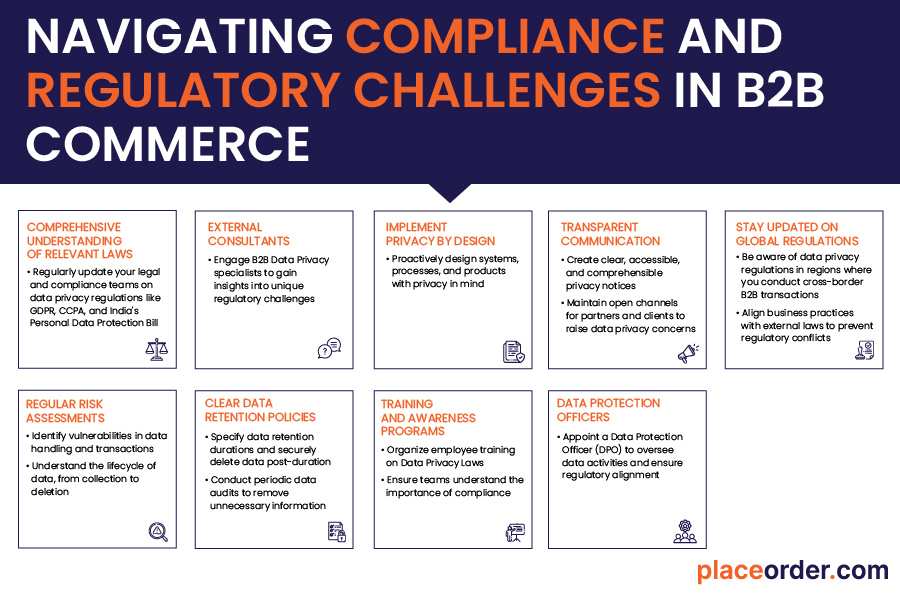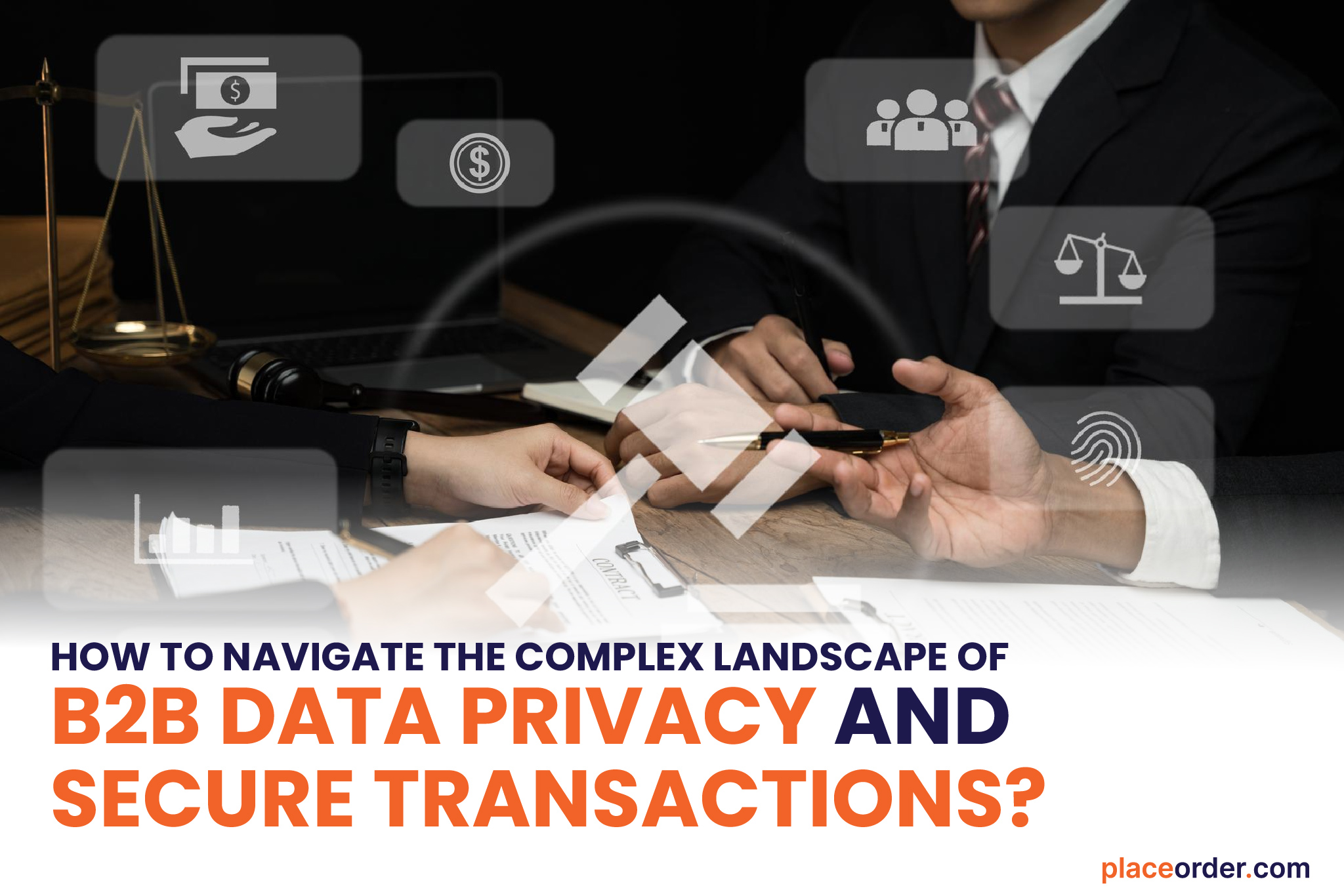In today’s dynamic and interconnected digital world, the significance of data privacy and secure transactions has reached unparalleled heights. This is particularly true in the realm of B2B commerce.
As businesses transition to online platforms and integrate technology into their core operations, the vulnerability to data breaches and privacy violations becomes increasingly apparent. The B2B commerce sector, a crucial contributor to India’s economic engine, isn’t immune to these challenges.
There is a growing reliance on digital channels to foster business relationships and execute transactions. So, the importance of understanding and navigating the intricacies of B2B Data Privacy becomes foundational.
For organisations operating within the B2B ecosystem, especially in India, this is not just a matter of maintaining trust or preventing financial losses. It is about adhering to Data Privacy Laws, ensuring Transactional Security, and instilling confidence in partners and customers alike.
This guide aims to shed light on the pressing need for a robust data privacy framework. Thus, emphasising the relevance of secure transactions in B2B commerce, and highlighting the best practices to ensure Data Privacy Compliance.
What is the Need for Data Privacy and Secure Transactions?
The regulatory landscape is continuously evolving, coupled with the escalating risks associated with cyber threats. Hence, it has become imperative for businesses to prioritise data protection and security in their strategies.
By doing so, businesses can not only maintain their competitive edge but also fortify their standing in a market that values trustworthiness and transparency.
What is the Current State of Data Privacy in B2B?
The rapidly evolving digital landscape has made the world more connected than ever, presenting boundless opportunities for B2B commerce. Yet, this digital evolution has also ushered in a myriad of challenges, especially concerning B2B Data Privacy.
Understanding the current state of data privacy within this sector is crucial for businesses to navigate these challenges effectively.
Complex Regulatory Landscape
With countries around the world recognizing the importance of data protection, there’s been a surge in Data Privacy Laws. This includes the GDPR in Europe and the Personal Data Protection Bill in India.
For B2B organisations operating on a global scale, this can be a challenging maze.
Ensuring compliance across different regions, each with its unique set of rules and regulations, necessitates constant vigilance and adaptation.
Emerging Threats
Cyber threats are not static. As businesses adopt advanced technologies, cybercriminals are concurrently upgrading their tactics.
This ongoing battle places B2B transactions, which often involve substantial sums and sensitive information, at heightened risk. The need for robust Transactional Security measures cannot be understated in this context.
Interconnected Supply Chains
One of the defining characteristics of B2B commerce, especially in regions like India, is the intricate web of interconnected supply chains. While this interconnectivity offers numerous operational advantages, it also presents vulnerabilities.
A breach in one entity can potentially expose data across multiple businesses, amplifying the consequences of a single security lapse.
Limited Awareness and Training
Despite the increasing importance of data privacy, there’s still a lack of comprehensive awareness and training among many B2B entities. This gap can lead to unintentional violations or oversights, putting both data and business reputation at risk.
Evolving Nature of Data
The type of data that businesses handle is continuously evolving. From transactional details to behavioural insights, B2B entities are delving deeper into data analytics.
This expansion in the nature and scope of data handled makes the task of ensuring Data Privacy Compliance more intricate.
Legal and Ethical Implications of Data Privacy in B2B
As the B2B sector undergoes a transformative shift, driven in large part by the digital revolution, it finds itself at the intersection of legal mandates and ethical imperatives. Understanding both aspects – the binding Data Privacy Laws and the moral obligations – is vital for businesses.
This will help them maintain their integrity, reputation, and trustworthiness in the marketplace.
What are the Legal Frameworks Governing Data Privacy in B2B?
Global Regulations
At the forefront of data protection legislation is the General Data Protection Regulation (GDPR) that originated in Europe but has ramifications for businesses worldwide. For B2B enterprises operating globally, ensuring GDPR compliance is not just about avoiding penalties but about fostering trust with European partners and customers.
Indian Perspective
For those involved in B2B Commerce India, the upcoming Personal Data Protection Bill promises to set the benchmark for data privacy. This legislation, once enacted, will outline the rights of individuals regarding their personal data and set the rules for its processing by businesses, including B2B entities.
Sector-Specific Laws
Apart from overarching data protection laws, some sectors have their specific regulations. For instance, financial services might have stricter guidelines concerning transactional data, necessitating even more rigorous Transactional Security protocols.
What are the Ethical Considerations in Data Privacy?
Trust and Reputation
Beyond legal compliance, B2B entities must realise that data privacy is a cornerstone of trust. Ethical handling of data sends a clear message to partners and customers about a business’s values and integrity.
In a competitive marketplace, such trust can differentiate a brand and enhance its reputation.
Transparency
Ethically, businesses have a responsibility to be transparent about how they use, process, and store data. This means clear communication with partners about data usage policies and immediate disclosure in the event of any breaches or potential threats.
Respect for Autonomy
Ethical data handling is also about respecting the autonomy of individuals and entities. This involves seeking informed consent for data collection and usage, ensuring that partners understand their rights concerning data, and honouring these rights consistently.
Obligation to Safeguard
Ethically, businesses have a duty to protect the data they handle. This goes beyond just Data Privacy Compliance and enters the realm of moral responsibility.
Businesses must adopt the best security measures available, continually update them, and ensure that every member of the organisation understands and adheres to these measures.
What are the Best Practices for Secure Transactions in B2B Commerce?
Securing transactions is not merely a technical necessity; it’s the backbone of trust in the B2B realm. With increasing digitalization, especially in vibrant markets like India, businesses must embrace best practices to ensure the safety and integrity of their transactions.
Ensuring robust Transactional Security safeguards both the tangible (finances) and intangible (reputation) assets of a business. Here are some guidelines to help businesses fortify their transactional processes:
Encryption
End-to-End Encryption
Ensure that all data transmitted during transactions, from initiation to completion, is encrypted. This means that even if data is intercepted during transmission, it remains unreadable to unauthorised parties.
Use Strong Encryption Protocols
Adopt the latest encryption standards, such as TLS (Transport Layer Security), to safeguard data. Regularly update these protocols to combat emerging threats.
Multi-Factor Authentication (MFA)
Layered Security
Require multiple forms of verification before a transaction is approved. This can include something the user knows (password), something the user has (a mobile device or smart card), and something inherent to the user (fingerprint or facial recognition).
Dynamic Codes
Use one-time passcodes or tokens for transactions, ensuring that even if login credentials are compromised, unauthorised transactions cannot be executed.
Regular Security Audits
Hire External Experts
Periodically bring in third-party experts to conduct thorough security audits. An external perspective can identify vulnerabilities that internal teams might overlook.
Immediate Remediation
If any flaws or weak points are identified during audits, prioritise their immediate resolution.
Advanced Threat Detection
AI and Machine Learning
Leverage artificial intelligence and machine learning tools to monitor transaction patterns. Such systems can detect anomalies or suspicious activities in real-time, triggering instant alerts.
Secure Payment Gateways
Trusted Providers
Partner with reputable payment gateway providers known for their Transactional Security measures. Ensure that they comply with global security standards like PCI DSS (Payment Card Industry Data Security Standard).
Employee Training
Regular Workshops
Organise consistent training sessions for employees, educating them on the importance of transactional security, the risks of breaches, and the best practices to follow.
Phishing Simulations
Conduct mock phishing tests to educate employees on the tactics used by cybercriminals, enabling them to recognize and thwart real-world attempts.
Backup and Recovery Plans
Frequent Backups
Regularly back up transactional data in secure, encrypted formats. This ensures that in the event of a breach or system failure, critical data can be recovered without significant loss.
Disaster Recovery Protocols
Have a clear disaster recovery plan in place, detailing the steps to be taken post a breach, including notifications, system restoration, and post-incident analysis.

How to Navigate Compliance and Regulatory Challenges in B2B Commerce?
With the digital realm constantly evolving, businesses in the B2B sector face a multifaceted challenge. That is – keeping pace with technological advancements while also staying compliant with an ever-changing regulatory landscape.
Especially in markets like India, where B2B commerce is booming, understanding and effectively navigating Data Privacy Laws is paramount. Here are some strategies to help businesses ensure compliance and tackle regulatory challenges head-on:
Comprehensive Understanding of Relevant Laws
Continuous Learning
Ensure that your legal and compliance teams are regularly updated on the nuances of data privacy regulations, both globally and locally. This includes being aware of GDPR, CCPA, and the upcoming Personal Data Protection Bill in India.
External Consultants
Engage external legal consultants who specialise in B2B Data Privacy. Their expertise can provide insights into specific challenges and nuances that your internal teams might miss.
Regular Risk Assessments
Identify Vulnerabilities
Conduct periodic risk assessments to identify potential vulnerabilities in your data handling and transaction processes. This can pinpoint areas where compliance might be lacking.
Data Mapping
Understand where and how your data flows. Mapping out the lifecycle of data—from collection to storage to deletion—can help in ensuring that all stages are compliant.
Implement Privacy by Design
Proactive Approach
Instead of retrofitting solutions, design your systems, processes, and products with privacy in mind from the outset. This approach ensures that data privacy considerations are integral to your business operations.
Clear Data Retention Policies
Defined Durations
Clearly stipulate how long data will be retained and ensure that post this duration, data is securely deleted. This not only ensures compliance but also minimises the risk of data breaches.
Regular Audits
Periodically review and audit stored data to check for any unnecessary or outdated information that can be purged.
Transparent Communication
Privacy Notices
Ensure that your privacy notices are clear, easily accessible, and comprehensible. They should detail how you collect, use, and store data, ensuring transparency with your B2B partners.
Open Channels
Maintain open channels of communication with partners and clients, allowing them to raise any concerns or queries related to data privacy.
Training and Awareness Programs
Informed Teams
Organise training sessions for your employees, making them aware of Data Privacy Laws and the importance of compliance. An informed team is less likely to make unintentional errors.
Data Protection Officers
Dedicated Role
Appoint a Data Protection Officer (DPO) or an equivalent role whose primary responsibility is to ensure compliance. This person can oversee data-related activities, ensuring they align with regulatory requirements.
Stay Updated on Global Regulations
Cross-border Transactions
If you engage in cross-border B2B transactions, be aware of the data privacy regulations in those regions. Ensure that your business practices align with these external laws to prevent any regulatory conflicts.
Is Proactivity Key in B2B Data Privacy and Secure Transactions?
Navigating the intricate world of B2B Data Privacy and ensuring secure transactions is no longer a mere afterthought in the vast spectrum of B2B commerce. It’s a primary pillar, vital for sustaining trust, ensuring legal compliance, and fostering meaningful business relationships, especially in dynamic markets like India.
The digital age, with its myriad of opportunities, also brings forth challenges that demand businesses to be vigilant. Data breaches, privacy violations, and non-compliance repercussions can be detrimental, not just in terms of monetary losses but also in the erosion of brand reputation and trust.
In such a landscape, taking a proactive, rather than reactive, approach becomes the defining line between businesses that thrive and those that falter.
A proactive approach encompasses more than just implementing standard security measures. It’s about continuous learning, staying abreast with evolving Data Privacy Laws.
Moreover, it’s about fostering a culture of data protection within the organisation, and always being one step ahead of potential threats. It involves recognizing that in the world of B2B Commerce India, secure transactions are a testament to a business’s reliability and commitment to its partners.
What Should Businesses Do?
For CTOs, CISOs, legal advisors, and decision-makers – now is the opportune moment to reflect and act. If you haven’t already, conduct a comprehensive security audit to evaluate the robustness of your organisation’s data privacy measures.
Ask the hard questions and be prepared to redesign and reinforce. In a world where data is priceless, ensuring its security is not just a necessity; it’s a responsibility.

